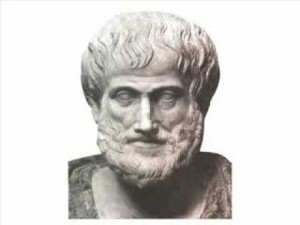by John Draeger (SUNY Buffalo State)
In my last post, entitled An Aristotelian conception of metacognition (part one), I described how my thoughts on teaching Aristotle next semester converged with
my thinking about metacognition. By analogy with physical health, I argued that learning is a
holistic endeavor requiring the cultivation of a variety of intellectual and emotional habits. Part one offered a general framework. Part two will consider a few of those traits, especially those likely to promote metacognition.
An Aristotelian approach to learning suggests that learning well requires more than performing a series of actions (e.g., going to class, completing assignments), but also requires developing particular traits that will facilitate learning excellence. For example, voracious learners are curious about the world. Curiosity fuels the learning process. It prompts learners to ask the next question, read the next book, and design the next experiment. Even with curiosity, learners can be stymied without the courage to face their learning fears and the patience to see things through. Courage requires facing those fears that keep us from moving forward without being so foolhardy as to believe that we are ready to climb every intellectual mountain. In practical terms, it means not letting the “I cannot do math” thought prevent students from pursuing an interest in science or engineering. Students should face their fears and diligently work to gain the relevant skills. Curious individuals with the courage to face appropriately uncomfortable learning situations must cultivate the patience to persist until the task is complete. These traits are interrelated and support each other. Curiosity can give us the courage to ask the tough questions and asking the tough question can reveal exciting new lines of inquiry. Patience can “buy time” until fear is managed or curiosity is reignited. Like all habits, we learn by doing, even if that includes making mistakes, and by continuously re-committing to doing what it takes to do it better next time.
The traits just described apply to many learning situations and there are many others that we might consider. I want to spend the rest of this post discussing two traits that seem particularly important to metacognition (e.g., self-monitoring, self-regulation). The first is honest self-scrutiny. Research on self-monitoring reminds us that learners are more effective when they track their progress towards particular learning goals and they are mindful of which learning strategies helped them achieve those aims. However, it is easy to kid ourselves into thinking that a learning strategy works better than it actually does. It can be difficult to take an honest look in the mirror and realize that we need to change how we do things. Honest self-scrutiny requires developing the wherewithal to formulate holistic appraisals that both acknowledge weakness and appreciate strength. It keeps us from self-deception (e.g., thinking that old habits are good habits) and from spending our time “freaking out” about our poor performance.
A second trait requires developing a discerning vision for what is most important within a particular learning context. Discerning vision helps learners identify the appropriate time and place for each learning strategy and encourages learners to use this understanding to guide learning behavior. For example, learners should be able to engage in close and careful reading. However, it is not always necessary to read everything with a fine-tooth comb. In the early stages of a literature review, a cursory reading of many things can alert the learner to which articles are most deserving of a closer look. Without discerning vision, a learner can be too concerned with the details and miss the big picture. Cultivating a discerning sense of what is most important will help learners best utilize their time and energies by providing a set of nested priorities given the particular learning context and these priorities will guide a learner’s choice of learning strategy.
Metacognitive techniques (e.g., self-monitoring, self-regulation) keep learners from blindly going through the motions and haphazardly achieving learning goals by encouraging them to be mindful of the complexity of each learning situation and using that understanding guide behavior. These techniques are vital to learning well, but they should not be seen in isolation. An Aristotelian approach reminds us learning well is a holistic endeavor that also requires cultivating various interlocking intellectual and emotional traits, such as curiosity, courage, and patience. Moreover, a holistic conception of metacognition suggests that learners must cultivate honest self-scrutiny and discerning vision alongside their efforts to improve self-monitoring and self-regulation.
Learning well requires curiosity, courage, patience, self-scrutiny, and discerning vision. Share on X